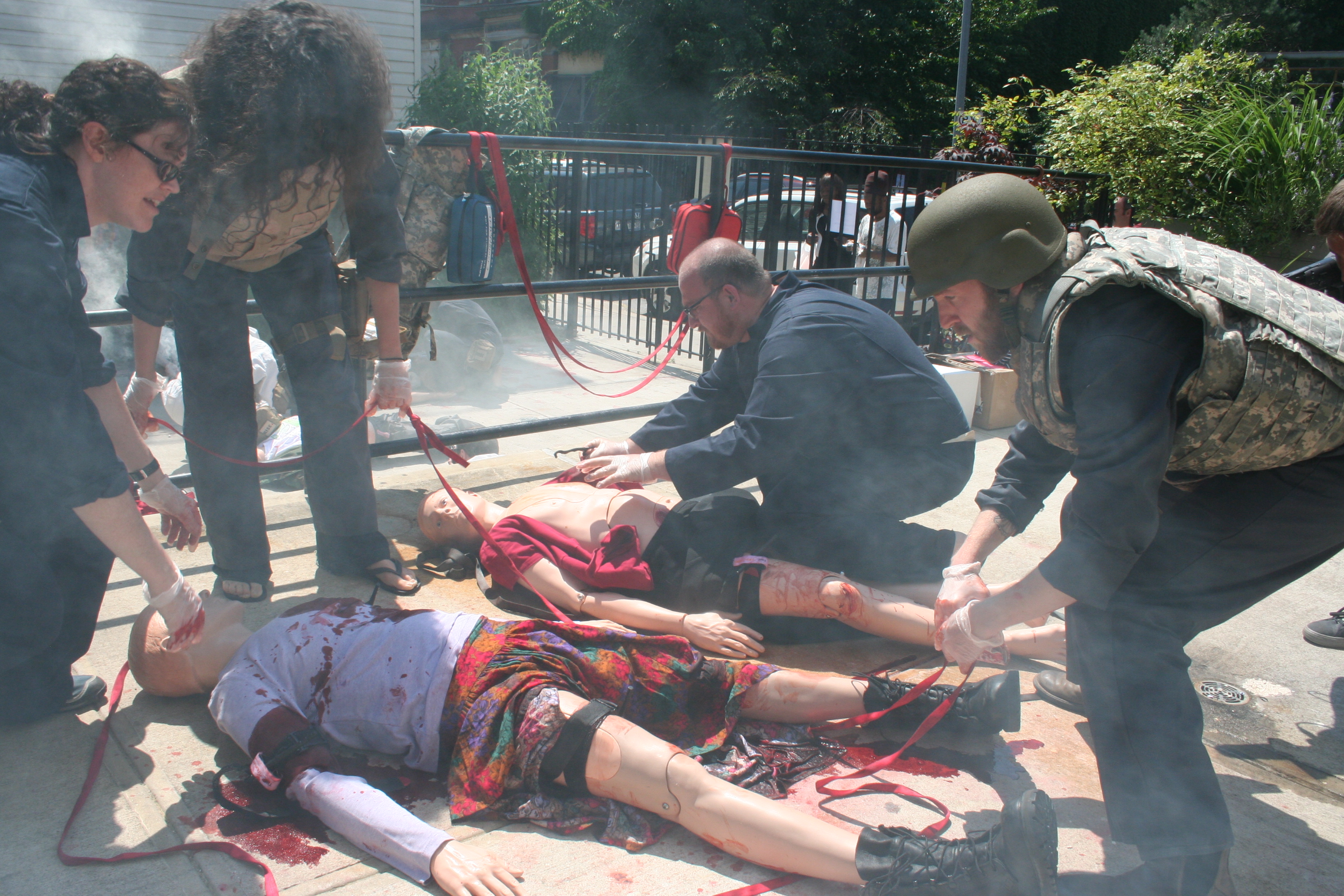
Bronx Documentary Center fills void left by newspaper closures
Sniper fire echoed in the tiny concrete courtyard behind the Bronx Documentary Center on Courtlandt Avenue on a Friday in June.
Residents walking past the gate on 151st St. did a double take, then stopped to stare at the carnage on the floor as smoke filled the air. A man walking his dog stared in disbelief as two teams of men in helmets and camouflage vests ran out to assess the injuries of the bloodied bodies on the floor.
The man laughed after the smoke cleared and he realized that the mangled bodies were dummies splattered with fake blood. The scene was part of a four-day workshop for freelance journalists preparing to report from conflict zones around the world. Trainers from a Maine-based wilderness survival organization and seasoned journalists from the group Reporters Instructed in Saving Colleagues staged graphic enactments of the kinds of dangers they may encounter, and recommended strategies for getting out alive.
The reporters learned how to splint broken and sprained limbs, how to assess different types of injuries, and how to make do when supplies run low. Armed with a pack of basic medical supplies, they role played; half pretended to be injured while the other half played rescuers.
Reporters Instructed in Saving Colleagues was formed in 2011 after freelance photographer Tim Hetherington was killed while covering the uprising in Libya. If the reporters who were with him had received basic medical training, it was later determined, they could have saved his life.
As more and more reporters turn to freelancing as a way to make a living in the wake of newspaper closures around the country, medical and crisis training are becoming increasingly vital, said Lily Hindy, who runs the group.
“I think it’s the nature of the job,” she said, adding that newspapers have traditionally prepared their staff for conflict reporting, but now the void must be filled.
“Journalists are kind of like anonymous people,” she added. “They bring the news and you don’t necessarily know who the journalists are.”
Recent wars have been deadly for western reporters, Hindy continued, pointing out that many have been kidnapped and murdered, but that the public underestimates the dangers journalists face.
“The majority of people, when I tell them what I do, they’re like ‘wow, I never really thought about that.’ The story was not that a journalist was killed,” she said.
The trainers alluded to recent wars in Iraq, Afghanistan, Libya, and Syria, and spoke about the plight of James Foley, a freelance reporter detained in Syria a year ago, and whose whereabouts are still unknown. Foley is a former participant in the group’s training sessions.
Lisa Armstrong, a journalism professor and freelance reporter who often reports from remote areas, said that she had had no first aid training prior to the workshop. Tim Hetherington’s death led her to conclude, “people die doing this, and his death could have been prevented.” The drills were invaluable, she added.
The training scenarios the group so painstakingly recreated were so realistic that some terrified neighbors called police during a warfare reenactment during the group’s first session in April. They have since held three more trainings.
“We told them it’s just pretend,” recalled Judi Alberi, who helped organize the scenarios and reenactments, adding that residents found the reenactment eerily similar to their everyday lives.
“We had signs up. They said ‘you don’t understand, we just had two shootings this week.’ People panicked over this, so we actually had cops standing there for the rest of the drill.”
Neighbors have come to realize that calling the cops is not necessary when war games break out at the Documentary Center. Olga Acevedo stood outside the Center’s gate throughout the day as the training went on.
“It’s really realistic,” she said. “Actually my tears came out. I get like that when I see people getting hurt.”
Acevedo found the reenactments helpful and thinks the trainings should be extended to Melrose residents as well as overseas reporters. “I’m watching so that I’ll know what to do in case I get in the same situation,” she said. “If I see something, I’ll at least be able to do something to help.”


[…] had attended a workshop with the group Reporters Instructed in Saving Colleagues at the center, and was a friend of its […]